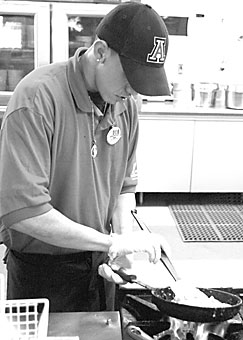 |
|
Jake Lacey/Arizona Daily Wildcat
|
Steve Montijo, a Cactus Grill employee, serves up an omelet. University Dining Services currently serves about 75 percent cage-free eggs in their meals.
|
|
|
By Nick Smith
Arizona Daily Wildcat
September 7, 2005
Print this
A UA graduate student is trying to get Student Union Dining Services to purchase whole, cage-free chicken eggs, but the switch could come with a cost, officials said.
Julie Cohen, a member of Students for the Ethical Treatment of Animals, said she supports a switch from eggs laid in a battery-cage setting to eggs that came from cage-free chickens.
Cohen, who is also a member of the Dining Services advisory group, said she feels cage-free eggs come from a more humane environment than their caged counterparts.
"We've been given this picture of happy animals on the farm, but the reality is much different from that," said Cohen, a clinical psychology graduate student.
Each battery cage measures 67 square inches and contains six to 10 chickens, Cohen said.
"I really believe that if people learn about these issues they'd feel it's not OK," said Cohen.
Cohen said in about two weeks she will conduct a survey to determine whether students support the switch to cage-free whole eggs.
Following the results of the survey, it will be up to the director of Dining Services to make the final call on the purchasing change.
The Student Union Memorial Center purchases 75 percent of its eggs in liquid form and 25 percent in whole egg form. Dining Services has recently begun purchasing its liquid eggs as certified cage-free. This move was cost neutral, said David Galbraith, director of Dining Services.
Six other colleges and universities across the nation have made the switch to cage-free eggs, either partially like the UA or completely, said Paul Shapiro, manager of the factory farming campaign of the Humane Society of the United States.
There are about 100 student-run campaigns nationwide that are pushing for their student unions to make the cage-free switch, Shapiro said.
But if Dining Services were to completely switch to buying cage-free certified whole eggs from the shell, prices could be affected, Galbraith said.
"It could possibly double the price of the egg dishes," he said.
Dining Services currently purchases 542 cases of whole eggs each year. Each case contains 15 dozen eggs. An additional 520 dozen certified organic eggs are purchased for retail.
At the Highland Market, 575 N. Highland Ave., a dozen large grade AA eggs costs $2.89. Conversely, a dozen large grade A brown eggs from cage-free hens costs $4.49.
There is no nutritional difference, however, between battery-caged eggs and cage-free eggs, said Wanda Howell, a professor in the nutritional sciences department.
"Just because they're in a cage or not will not affect the nutritional composition," Howell said. "What does affect it is the feed of the hen."
The chicken feed is fairly standardized in order to get a consistent quality of egg. The feed free-range chickens eat depends on what is available, Howell said.
An organic label on eggs means the chicken feed contains only natural ingredients; no hormones or other additions. Organic eggs can come from either battery-caged or cage-free chickens, Howell said.
Clint Hickman, vice president of sales at Hickman's Egg Ranch, said he has his own concern about cage-free eggs.
"On a personal preference, I will never eat a cage-free egg," said Hickman, a 1988 UA marketing alumnus. "Those chickens have access to eat their own fecal matter."
Hickman's Egg Ranch raises its chickens in battery cages, but also buys and distributes cage-free and organic chicken eggs to meet the demands of their consumers, Hickman said.
Hickman said he is also concerned with the economic impact that switching to cage-free eggs could have on his alma mater.
"I don't have a problem with cage-free eggs," he said. "I do have a problem with a small segment of students that voice an opinion that could have an effect on the eating habits of the majority of students. I'd much rather have a $1 breakfast burrito then pay $1.50 for a burrito."
An increase in prices could drive students to choose a different meal to eat.
"I don't know if I'd buy it," said Mike Griffis, referring to a potential price increase of an omelet at the student union.
Griffis, an aerospace engineering junior, said he has a meal plan and would feel forced to pay the extra amount if the switch went into effect.
